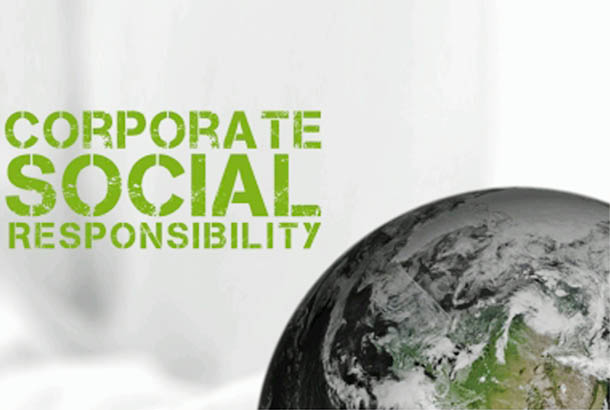CSR is the right platform to make a difference to the society by providing succour to the have-nots and deprived. But the money intended in many cases are subverted or misused for personal gain. The government on its part has amendment and made the act more stringent. Now, the onus is on corporate entities to step-in with right spirit and make CSR a success
Helping the have-nots have always been ingrained in Indian ethics. Not only India world over the concept of helping the have-nots have been there for a very long time and it has been preached through ages by the wise sages and the prophets. All the religions give utmost importance to charity. In Hinduism, it is believed, the act of charity with compassion towards the have nots will help them to attain moksha (liberation from the cycle of death and rebirth). A quote from the Bhagwat Gita says, "Give with respect and love, and to give in plenty. That is the spirit. Giving is good; and if the gift is given with a good heart, without expecting anything in return it's a act of reaching spiritual highness and true humanity".
In the Bible it is mentioned, "Whoever is generous to the poor lends to the Lord, and he will repay him for his deed. The generous will themselves be blessed, for they share their food with the poor". Helping poor and needy by giving charity is considered as one of the virtuous acts in Islam and in the Quran it is mentioned, "It is not righteousness that you turn your faces towards East or West. But the righteousness is to believe in Allah and the Last Day, and the Angels, and the Book, and the Prophets, and to give of your wealth out of love for Him, to your kin and orphans and the needy and the wayfarer and those who ask, and for the ransom of slaves…" (Quran, 2:177).
From Trusteeship to CSR
But all these is for the individuals, the mortal 'us' on earth. The concept of organisation or company or corporate contributing their excess wealth (profit) to the cause of social upliftment, now popularly known by acronym CSR, can be traced to Mahatama Gandhiji's concept of Trusteeship. CSR stands for corporate social responsibility. According to Mahatama Gandhiji's concept wealthy people should be persuaded to part with their wealth to help the poor. Putting it in Gandhiji's words "Supposing I have come by a fair amount of wealth – either by way of legacy, or by means of trade and industry – I must know that all that wealth does not belong to me; what belongs to me is the right to an honourable livelihood by millions of others. The rest of my wealth belongs to the community and must be used for the welfare of the community." Those were the time when the whole country was fighting for independence from the Britishers. Leading Industries came forward to help the poor in time of famine or natural calamities. For a long time in India, philanthropy activities were confined to a very few corporate houses.
CSR, now a part of corporate
CSR as a mandatory activity for corporate entity was introduced through an amendment in the Companies Act, 2013. As per the Gazette notification of Ministry of Corporate Affairs, published February, 2014, every company having net worth of rupees five hundred crore or more, or turnover of rupees one thousand crore or more or a net profit of rupees five crore or more during any financial year shall constitute a Corporate Social Responsibility Committee consisting of three or more directors, out of which at least one director shall be an independent director. Under sub-section (3) of section 134, the company shall disclose the composition of the Corporate Social Responsibility Committee and the committee shall formulate and recommend Corporate Social Responsibility Policy to the board which shall indicate the activities to be undertaken by the Company as specified in Schedule VII and recommend the amount of expenditure to be incurred on the activities and monitor the CSR policy of the company from time to time. As per the clause 135 of the Companies Act, provided that the company shall give preference to the local area and areas around it where it operates, for spending the amount earmarked for CSR activities, Further, if the company fails to spend much amount, the Board shall, in its report made under clause (o) of sub-section (3) of section 134, need to specify the reasons for not spending the amount. The Act encourages companies to spend at least 2 per cent of their average net profit in the previous three years on CSR activities.
The laws are made in good faith. But there are those who finds loopholes in the laws and misuse for their own goods. In the guise of spreading awareness about health and hygiene CSR funds were used to market and advertise their own products. There were reports of PSU staffers being questioned by Ministry of Corporate Affairs officials for misuse of CSR funds for political or personal gains. In a report of the high level committee on Corporate Social Responsibility, it was found that the major reason for underutilisation of CSR money was excuses like 'suitable projects not found' and 'unable to find suitable implementation agencies'. Apart from these there are few other ways to launder the CSR money for personal gains.
Stringent amendments to prevent misuse
Taking note of the misuse of CSR act the government has recently amended Corporate Social Responsibility (CSR) rules for companies. As per the amended rules, organisations with net worth of Rs 500 crore or more, turnover of ₹ 1,000 crore or more, net profit of ₹ 5 crore or more, will have to spend 2 per cent of their average profits of the previous three years on CSR activities every year. In case an organisation fails to spend 2 per cent on CSR activities, it will have to state the reasons for not being able to do so. If the unspent amount doesn't relate to any ongoing project, the organisation will have to transfer it to a fund notified by the government. Many companies conduct CSR activities through implementing agencies. However, the new rules restrict organisations from authorising either a Section 8 company or a registered public charitable trust to conduct CSR projects on their behalf. An entity registered with the purpose of promoting charitable causes and is prohibited from distributing dividends to shareholders is a Section 8 company. This rule would impact many organisations' CSR initiatives that they conduct through private trusts. So, the change in rules means that such private trusts will have to be converted to registered public trusts, or stop acting as CSR implementing agencies. Any organisation with a CSR obligation of ₹ 10 crore or more for three previous financial years will have to hire an independent agency to conduct an impact assessment of all those projects that have an outlay of ₹ 1 crore or more.
"With the 2% spend requirement being made mandatory for companies, CSR does provide a huge opportunity for Corporates to bring in their execution expertise, goal orientation and agility to the development sector. This has the potential to change the developmental ecosystem positively. The recent amendments bring more accountability to CSR and provide a good direction. However, it is desirable to ensure that CSR retains its intrinsic value of responding to the needs of the underserved and does not become a compliance driven activity. In L&T's case, we have always been involved in positively impacting people's lives and always exceeded the stipulated spend requirement," says Dr. Hasit B Joshipura, Member of Executive Committee, Senior Vice President & Head of Corporate Center, Larsen & Toubro.
Covid-19: The real test of CSR
The ongoing pandemic during its initial period destroyed the livelihood of many a people. It was during this period many a corporate houses rouse to the occasion and helped the needy. "TKM has been at the forefront in supporting the needs of the local communities and various Government departments during the unprecedented event of Covid-19. To support the frontline workers, we have been providing logistical support through various measures such as providing buses to the health department of Karnataka, ambulances to Governments of Karnataka and Haryana and a mobile medical unit to the Indian Institute of Science for Covid testing. To protect the frontline workers, we contributed more than 3,500 Hazmat suits, 72,000 three-ply masks, 71,000 bottles of sanitizers and 12,500 examination gloves to healthcare workers, law enforcement and other relevant agencies in Karnataka. In addition, we handed overessential materials such as thermal scanners and fumigation equipment to the 100-bedded Covid hospital in Ramanagara. To help the daily wage workers, we distributed 3,500 food kits benefitting over 15,000 people," says Vikram Gulati, Country Head & Senior Vice President, External Affairs, Public Relations, Corporate Social Responsibility & Corporate Governance, Toyota Kirloskar Motor. "Our immediate response to need for protective equipment, testing kits, medical supplies and food reached beneficiaries across 12 states. N95 masks, PPE kits and indigenous Covid-19 test kits that could detect the infection in flat 2.5 hours were among medical supplies provided. More than 2.5 lakh meals were provided to stranded daily wage earners and health workers during the initial days of the lockdown, 11,000 kgs of rice was distributed. Almost 5,000 grocery kits have been provided to families. Additionally, dry ration was provided to children to ensure nutrition as substitute of cooked meals provided by Balwadis and Anganwadis. The augmentation of health infrastructure through supply of critical medical equipment such as ventilators, patient monitors, dialysis machines, oximeters, CT scan and ECG machines, fowler beds and other medical apparatus in hitherto under resourced designated Covid-care centres well before the cases started to grow across locations has enabled them to deal with the current influx of patients requiring critical care. Provision of robotic nurses and CT scan machine in a shielded box to hospitals not only helps protect hospital staff, but it also creates a culture of trust in technology as an aide in combating such a crisis," says Dr. Hasit B Joshipura.
"Lockdown and impact of Covid-19 has led to loss of livelihood and reverse migration. Keeping this in mind, we have focused on creating agriculture-based livelihood. Our short-term efforts are directed towards providing for the immediate relief needs of the communities we work with by distributing food, ration kits, etc. For the long term, our efforts are directed towards creation of sustainable income for the targeted communities. So, we not only ensure food security for the current times, but also help towards meeting future needs," says Arathi Shetty, Non-Executive Director, Allcargo Logistics.
The way forward
In a country like India where close to a third of its citizens are deprived of one basic essential or the others, it is a prerogative for corporate entity to step in and help the have-nots in their sufferings. But, even after introducing laws to make CSR contribution mandatory, a few corporates entity find ways to avoid or subvert CSR money. As per data sourced from the Ministry of Corporate Affairs, businesses spent less than half on corporate social responsibility in 2019-20 compared to the year before. Corporate India spent a little over ₹ 7,800 crore in FY2020 against ₹ 18,655 crore the year before. Data available with the Ministry of Corporate Affairs showed that 248 entities, including large technology, automobile, and food companies, spent less than the required amount, while 98 companies including those in cement, insurance, and pharma spent nothing. Meanwhile, the spending on health, disability, and livelihoods more than halved in FY20 to ₹ 3,582 crore. The share of state-owned companies in overall CSR spending, which was at 20 percent in FY19, came down to about six percent in FY20.
What can be inferred from the low spent and nought spent on CSR is either the corporate entities are not serious or the government has to bring in more stringent laws. Even then laws can only provide the framework, the onus is on the corporate entities to adhere and put the laws into action for the betterment of the society, especially the deprived and the have-nots.






